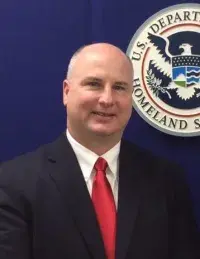
This isn’t your father’s story of diversity, equity, inclusion and accessibility (DEIA). We’ve gotten past that. Or have we?
Although the TSA movement continues to evolve, one thing is clear: this train is moving forward.
Brian Cahill, a former skeptic, has a powerful testimony about unconscious bias, and it’s worth knowing.
No, not me. Certainly not me.
A couple of years ago, Jacksonville International Airport Federal Security Director (FSD) Brian Cahill halfheartedly attended exploratory Diversity and Inclusion committee meetings out of a sense of obligation, so it’s not surprising he was uneasy about what he heard.
“I was taking strong offense to this,” recalled Cahill. “My question was ‘What are we trying to accomplish with this?’ There’s no other country in the world that does diversity and inclusion better than the U.S., so I wanted to know what problem we were trying to solve.”
It was a sincere question. Cahill, a white, middle-aged military veteran saw himself as, if not exactly woke, definitely in tune with his airport environment and the world around him.
“After all, I have friends of all races and sexual preferences,” said Cahill. “I’m married to a Chamorro woman from Guam, and I’m a member of the Sault Ste. Marie Tribe of Chippewa Indians. I felt strongly that I am not biased, and I didn’t appreciate being told that I was,” said Cahill, who tightly held to his all-for-one, one-for-all military training. And he didn’t stop there. “I also said, ‘Inclusion must mean everybody,’ because no one should feel excluded.”
And there it was — out in the open — for everyone to hear.
“So if we’re going to talk about diversity and inclusion, it can’t be at the exclusion of any one group,” said Cahill.
Suddenly, looking in from the outside didn’t feel so good to Cahill.
And just when you think you’ve got it, wham, right between the eyes.
Feeling emboldened and accepting, but still skeptical, last month Cahill agreed to host a Florida/Georgia listening tour with new Chief DEIA Officer Dr. Vernell Sutherland.
Sutherland, tapped by Administrator David Pekoske to uphold TSA’s 10th leadership principle to support and sustain an inclusive culture, took to the field in a two-way conversation. Immersing herself in the airport environment, Sutherland met with TSA staff members and employees in Florida at Orlando and Jacksonville, and in Georgia at Brunswick and the Federal Law Enforcement Training Center.
“I’m thinking this is driving Miss Daisy,” said Cahill of his role in the tour. “Kind of serve as an executive assistant. Stay on agenda. Take good notes. My only responsibility beyond that was putting together the Jacksonville agenda. I had no vision of becoming such an integral part of her discussions.”
Cahill’s DEIA aha, drop-the-mic moment came the first morning of the tour.
“I was enjoying breakfast at my hotel when a woman, who appeared strange to me, arrived in the breakfast area,” said Cahill.
She was dressed in clothes which, in his opinion, were not right for the climate or the occasion, and she was groomed in a manner which was bizarre to his conventional tastes. Before he could rationalize his thoughts, he snapped to judgment.
“What immediately came to my mind was, ‘This woman is weird, and I hope she does not sit next to me.’’’
When Cahill got up to get another cup of coffee, he felt someone standing next to him. What were the odds?
“When our eyes locked for that one, awkward nanosecond, the woman very kindly and sweetly greeted me,” Cahill sheepishly said.
“Good morning, sir,” said the strange woman, addressing him directly. “I hope you enjoy this beautiful day in Florida.”
“Immediately I thought, ‘What a jerk I am,” said an embarrassed Cahill.
When he returned to his table, Cahill pondered the exchange and figuratively heard the DEIA train whistle as clearly and as loudly as he ever had.
“Before we in federal service started talking about DEIA in earnest, I would have never given this encounter a second thought,” said Cahill. “But now, after becoming a little more educated about bias and how it might have an impact on me at work and at home, I was actually cognizant of what I had just done.”
“Translation is not a matter of words only: it is a matter of making intelligible a whole culture.”
– Anthony Burgess
Cahill sat with his new, enlightened attitude through the first couple of meetings, politely helping field employees phrase their questions and listening to the conversations, until someone asked a version of his original, “what problem are we trying to solve” question.
“Ma’am,” Cahill respectfully addressed Sutherland. “Do you mind if I share this story?”
In great detail, he related his breakfast experience.
“I felt like I was really making myself very vulnerable,” said Cahill. “But you could see light bulbs coming on.”
“In his case, (his testimony) meant that he realized, ‘Oh, that is what DEIA means in my personal life,” said Sutherland. “He related that story to every group. It meant, in Brian’s case, ‘I was judgmental and didn’t know it.’ It’s not a thing or a project. It’s a change in behavior and attitude.”
Just the beginning
In his professional role, FSD Cahill has a heightened awareness of bias – his and others. He’s hard pressed to articulate exactly what specific DEIA changes have taken root.
“Other than awareness and hoping that it helps prevent bias from creeping in, it will certainly help in my decision making,” said Cahill.
When asked whether or not DEIA can be sustained, Cahill shared, “Who would want to go backwards? I couldn’t put this feeling in a bottle if I wanted to. I couldn’t. I couldn’t throw it away and start over. It would be impossible for me to do that. I went from being an extreme skeptic to saying now I see how being aware of my bias helps make me a better person.”
By Karen Robicheaux, TSA Strategic Communications & Public Affairs


